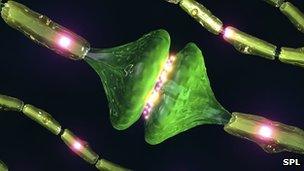Number of multiple sclerosis patients in the UK 'growing'
- Published

In MS patients the body's immune system attacks and destroys the myelin coating of nerves
The number of people diagnosed with multiple sclerosis in the UK is falling while the number of those living with the disease is growing, research shows.
Scientists at the University of Dundee found that between 1990 and 2010 there was a 2.4% annual rise in MS patients despite a fall in new cases.
The increase was put down to improved mortality rates, which fell 3% a year.
Researchers believe the findings, external could have a major impact on the future allocation of resources for patients.
The study estimated that across the UK just over 6,000 people were diagnosed with multiple sclerosis during 2010 and there were nearly 127,000 people living with the condition.
In MS patients the body's immune system attacks and destroys the myelin coating of nerves in the brain and spinal cord.
'Environmental factors'
The peak age at which MS is diagnosed is between 40 and 50 years.
The disease is much more common in women than in men - 72% of people living with MS in 2010 are women.
Dr Isla Mackenzie, who led the research, said the study covered patients from GP practices throughout the country.
She said: "This study provides an up to date national picture of the epidemiology of MS in the UK.
"It is important to have this information on the prevalence of MS in order to understand the impact of this disease and to ensure that adequate resources are provided both nationally and regionally for people affected by MS."
MS is more common in Scotland than in other regions of the UK.
Dr Jonathan O'Riordan, consultant neurologist at Ninewells Hospital in Dundee, said: "There are probably genetic and environmental factors at play to explain why it is more common in Scotland.
"The vast majority of newly diagnosed patients will have the relapsing remitting form of the disease and will be eligible for consideration of disease modifying therapies.
"These can cost anywhere from £5,500 to nearly £20,000 per year. This has ongoing cost implications for health care providers."
- Published21 July 2013
- Published29 April 2013